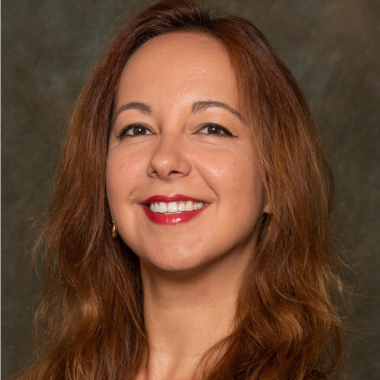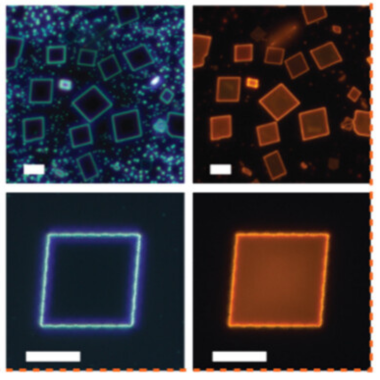From Nobel Prize to Spartan Pride: David MacMillan Visits MSU
Article Highlights
- In December, Nobel Prize-winner Professor David MacMillan visited MSU to take part in a variety of commencement and community events.
- MacMillan shared the 2021 Nobel Prize in Chemistry for his work with asymmetric organocatalysis—a breakthrough that’s led to easier, cheaper, and greener approaches to creating specialized molecules.
- MacMillan addressed graduating students, the East Lansing public, as well as members of MSU’s Department of Chemistry. During his visit, he received an honorary Doctor of Science from MSU in recognition of his scientific impact and lifelong advocacy for accessible education.
What would you ask a Nobel Prize-winning scientist if given the chance?
Would you want to know how their life has changed since that first phone call from
the Royal Swedish Academy of Sciences? Or maybe you’d like to learn what direction
their world-renowned research was headed in next?
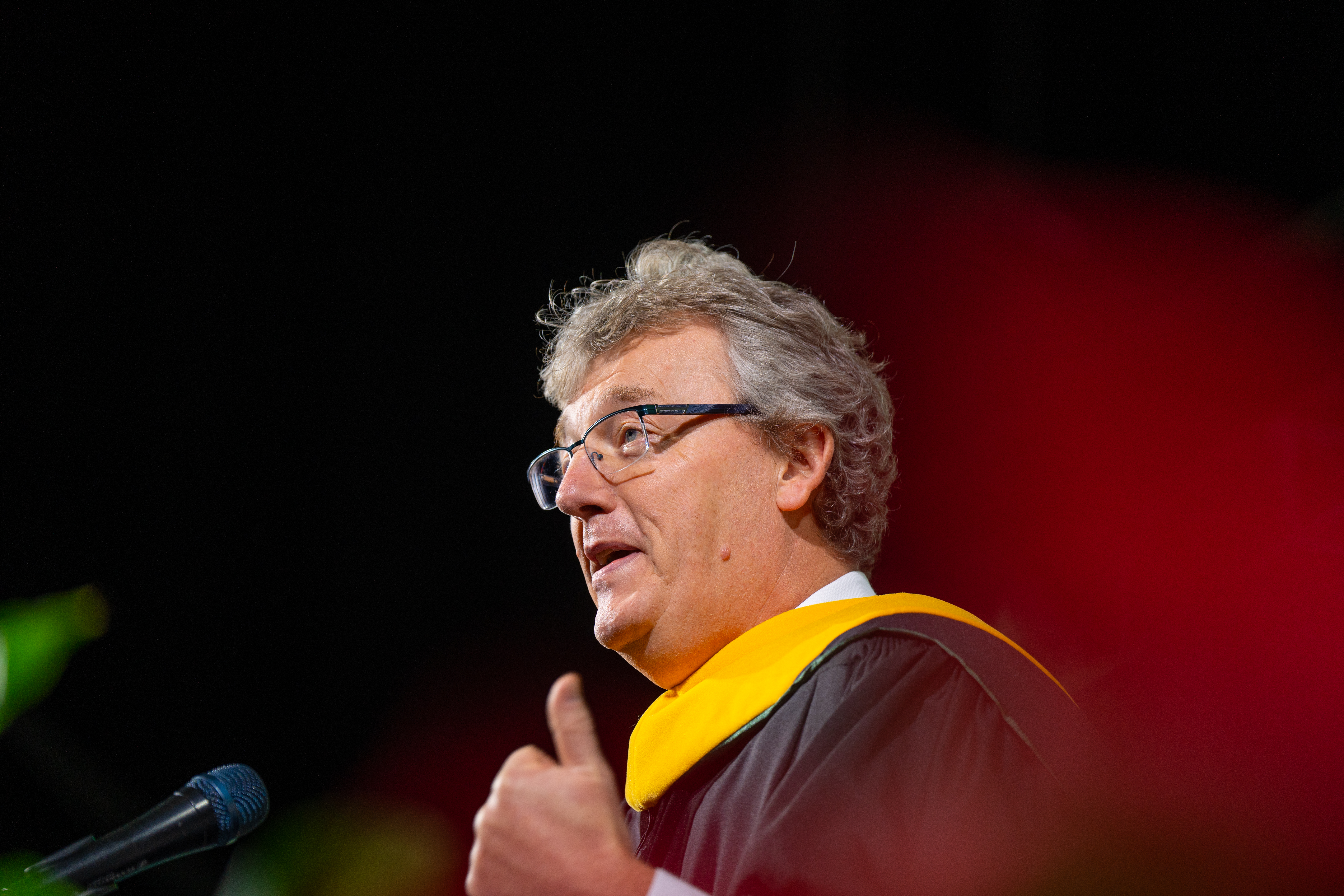
David MacMillan addresses graduates during fall commencement. During his speech, he encouraged the newest class of Spartans to learn from others, laugh every day, and learn from failure. He made special note of the hardships the class of 2023 overcame, and how these challenges prepared them more than ever to change the world. Photo credit: Credit: Michigan State University/Nick Schrader
During last December’s commencement festivities, the Michigan State community had the rare opportunity to ask these questions and more as Professor David MacMillan visited East Lansing, taking part in a variety of lectures and public events.
Currently the James S. McDonnell Distinguished University Professor of Chemistry at Princeton University, MacMillan shared the 2021 Nobel Prize in Chemistry for his work with asymmetric organocatalysis.
MacMillan discovered that in addition to the tried-and-true catalytic agents of enzymes and metal complexes, it’s possible to use small organic molecules with equal or even greater efficiency. This breakthrough has led to easier, cheaper and greener approaches to creating specialized molecules.
MacMillan’s research is especially exciting given its ability to produce asymmetric reactions. Here, more of a preferred variant of a molecule is created during catalysis that otherwise has two mirrored forms — not unlike our right and left hands.
Asymmetric catalysis is crucial as oftentimes one variant of a molecule is helpful and the other harmful. For instance, while the “left-handed” molecule of the medication ethambutol treats tuberculosis, its “right-handed” counterpart causes blindness.
Inspiring newest Spartan alumni
While at MSU, MacMillan addressed thousands of graduates during 2023’s fall commencement ceremonies. In a speech at the Breslin Center, he offered students key life advice taken from years as a scholar, educator and leading scientific voice: learn from others while following your own path, laugh every day and learn from failure.
MacMillan also drew attention to the unique hardships that 2023 graduates overcame during their time at MSU, such as earning their degrees during the upheaval of the pandemic.
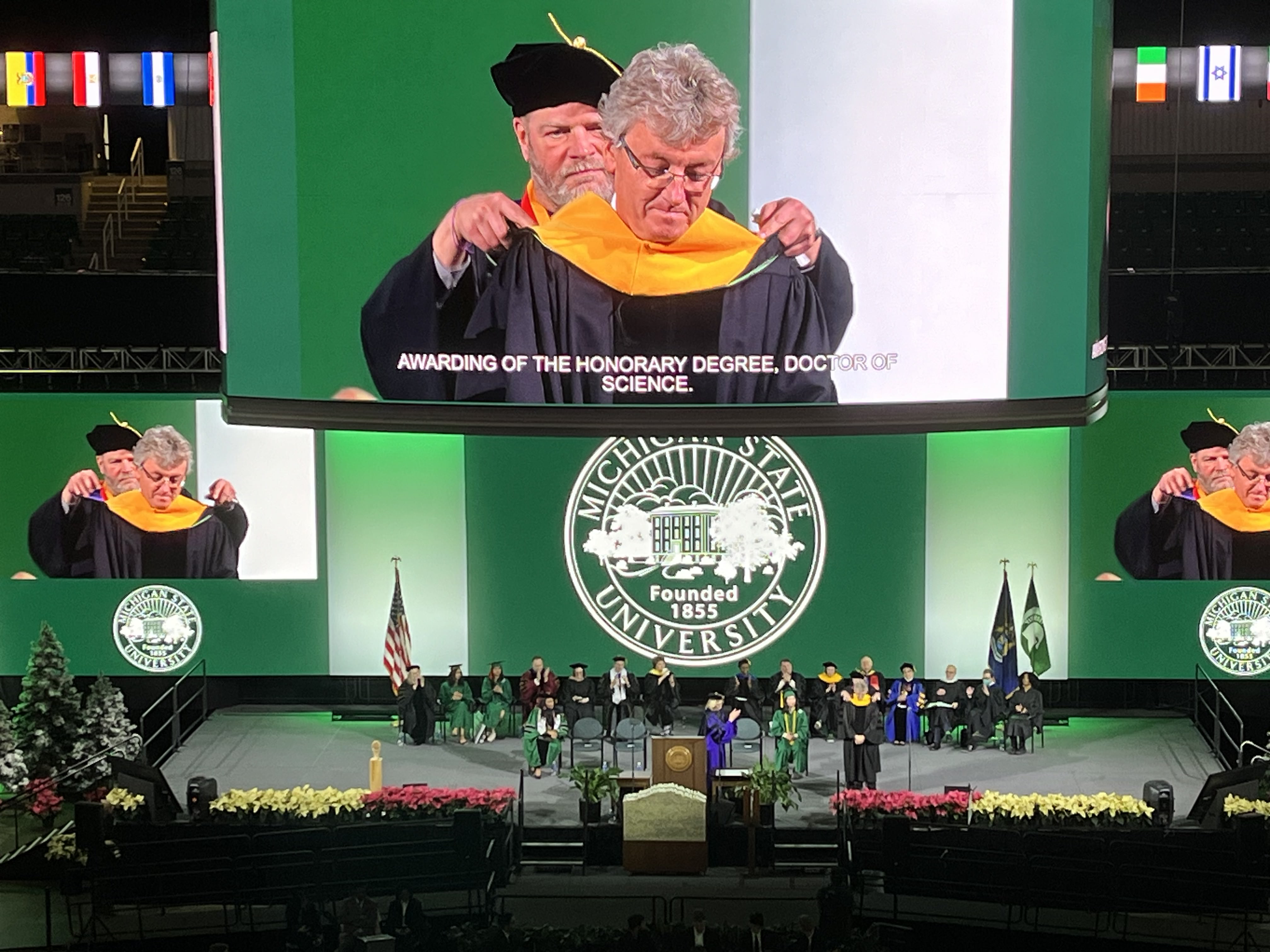
David MacMillan is hooded by interim provost Thomas Jeitschko during fall commencement. MacMillan was nominated for an honorary Doctor of Science by friend, collaborator, and MSU Chemistry professor, James McCusker. This degree recognizes MacMillan’s groundbreaking research as well as his lifelong support of accessible education. Photo credit: James McCusker.
“Take these unique life lessons from the last four incredible years and use them to build your careers, your families, your friendships, your loves and your lives because you are more equipped to do so than almost any other class in history,” said MacMillan
“There is no generation of college graduate students more ready to take on the world.”
At the start of the ceremony, MacMillan was presented an honorary Doctor of Science by interim provost Thomas Jeitschko and interim president Teresa K. Woodruff, Ph.D.
“I don't know if I’m officially allowed to call myself a Spartan, but I really don't care — because I feel that I'm a Spartan,” MacMillan told the audience.
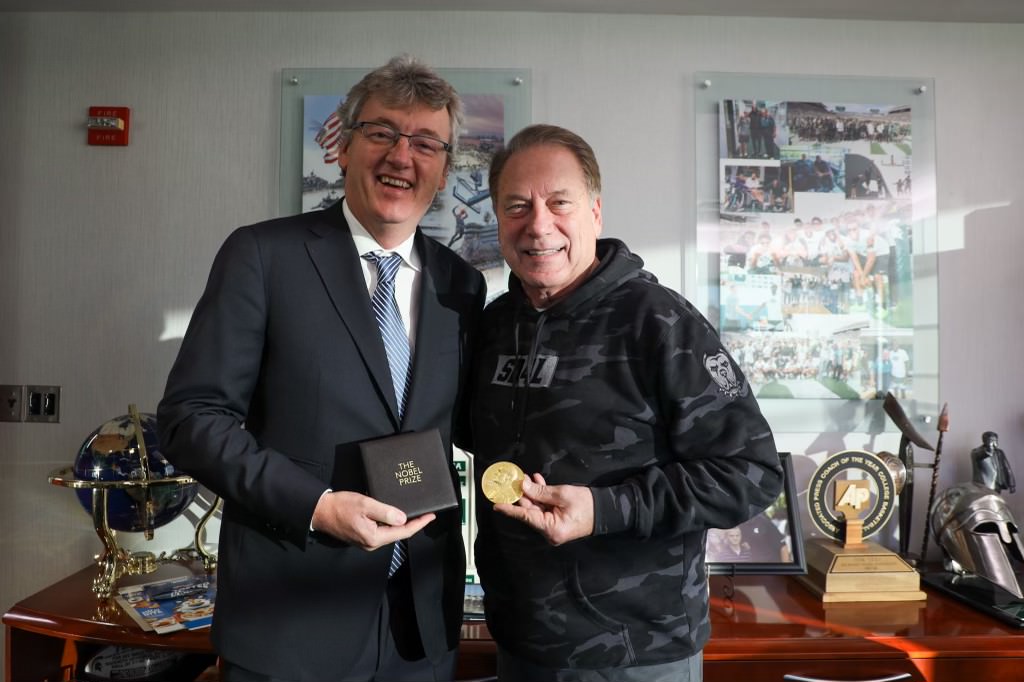
“Just to make it more official, yesterday I met with Coach Izzo and he gave me a motivational speech. I’m now ready to run through a wall for Michigan State.”
An education for all
MacMillan was personally nominated for this honorary degree by longtime friend, collaborator and MSU Foundation Professor and Department of Chemistry faculty, James McCusker.
In addition to the Nobel laureate’s world-changing research, McCusker nominated MacMillan for his tireless advocacy for accessible education.
MacMillan often credits the public-school training of his native Scotland for his scientific success. Upon receiving the nearly $500,000 share of his Nobel Prize award, he created a foundation to provide college scholarships to academically gifted yet financially challenged Scottish students.
This generosity earned MacMillan a knighthood from Queen Elizabeth II, and in McCusker’s opinion, perfectly aligns with MSU’s own educational legacy.
“There’s a beautiful synergy between Professor MacMillan’s belief in public education and MSU’s own institutional commitment as the premier land-grant university of the United States: to provide accessible learning for the next generation,” McCusker said.
McCusker and MacMillan share a decades-long connection as friends and colleagues, making the Nobel laureate’s newfound link to MSU all the more special.
The two are currently co-leaders at Princeton’s Bioinspired Light-Escalated Chemistry, orBioLEC, Energy Frontier Research Center and were previously assistant professors together at the University of California, Berkeley. During this time, McCusker recalls celebrating the publication of an early organocatalysis paper by MacMillan after a particularly difficult review process.
As fate would have it, the Nobel committee cited this same paper years later when awarding MacMillan his prize, and McCusker would be the first person to receive a text with the incredible news.
Community chemistry
In addition to addressing the latest class of Spartans, MacMillan took part in a wide range of campus events. These included a public lecture at the Kellogg Center titled, “What's it like to win a Nobel Prize? The path and discovery via science, catalysis, and good luck.”
He also held more intimate conversations with members of MSU’s Department of Chemistry.
David MacMillan speaks with MSU graduate students and postdocs. MacMillan offered attendees guidance on how to make a name for themselves as young researchers, encouraging them to pursue genuinely exciting scientific projects and to make the most of their early momentum. Photo credit: Connor Yeck.
One of those conversations took place in a lecture hall filled with graduate students and post-doctoral researchers. Here, he answered questions about successfully pursuing careers in science and overcoming the many challenges faced by young researchers.
“You want to find science and projects that you’re authentically excited about,” MacMillan offered. “Jump in at this starting stage and use all of your momentum and energy to get the most done early.”
“Having the chance to have an honest discussion with Professor MacMillan was a very memorable experience for everyone who attended his Q&A,” said doctoral student Chrissy Schumm.
“He’s a true leader in the scientific community, and has a natural ability to inspire all people considering a career in chemistry.”
Angela Wilson, associate dean and John A. Hannah Distinguished Professor of chemistry, echoed the special impact MacMillan’s visit had on MSU Chemistry.
“Sir David MacMillan is one of the greatest scientists of our time, and his humility, humor and care for others are an inspiration. I have no doubt that his visit will have a long-lasting positive impact for all who met him
“I thought it was terrific that he took the time to meet with our newest faculty members and students,” she added. “He also brought the Nobel Prize along to share, which was quite exciting — even for a business student who showed up for his talk!”
For those wanting to learn about MacMillan’s current and future research, he also hosted a science-centric lecture titled, “The Development of Asymmetric Organocatalysis and Metallophotoredox.”
Caption: David MacMillan has coffee with MSU Department of Chemistry assistant professors. MacMillan met with many members of the chemistry community, culminating in an academic lecture on his latest work with asymmetric organocatalysis and metallophotoredox. Photo credit: Connor Yeck.
During his talk, he offered a glimpse into his lab’s ongoing efforts to combine photoredox catalysis — the use of light to drive chemical reactions — with transitional metal catalysis.
These and other breakthroughs from the MacMillan lab are helping supercharge medicinal chemistry’s ability to discover new pharmaceuticals and continue the group’s legacy of world-shaping success.
“Professor MacMillan’s work with photoredox catalysis has resulted in yet another transformational change in the field of organic synthesis,” said McCusker. “It’s not hard for me to imagine him winning a second Nobel Prize in the not-too-distant future.
“I know this would make his mother-in-law immensely happy, who quickly learned some scientists do receive the award twice.

